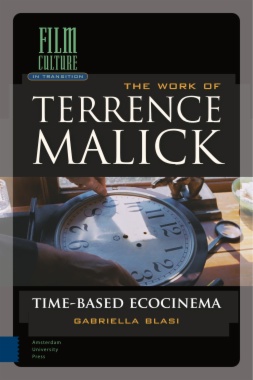The Work of Terrence Malick: Time-Based Ecocinema develops a timely ecocinema approach to film analysis illuminated by Benjamin's notion of the turn of time. Current work on Malick's films emphasizes the spatial dynamics of his cinema, particularly as it pertains, from within a phenomenological framework, to the viewer's experience of films. This book redirects scholarly attention to the way Malick's directorial work shapes time and duration, laying new groundwork for the analysis of how films unsettle nature-culture binaries in modernity. The study performs this intervention through a rigorous engagement with Walter Benjamin's work on time, violence and technologies and the emergent figural approach to aesthetics in film studies. Each of these methods has important precedents in film studies and other fields. The combination of methods performed in this book contributes to understanding the relevance of a time-based approach to Malick's films and the practical implications of a time-based relation to history in contemporary ecocinema discourses.
- Cover
- Table of Contents
- Acknowledgments
- Introduction
- Framing Nature and History in Malick Scholarship
- Ecocritical Film Studies and the Problem of Space
- The Figural Approach to Analysis in Film Studies
- Benjamin’s Concept of Time in Film Studies
- Terrence Malick’s Work: Time-Based Ecocinema
- Works Cited
- 1. From Myth, Tragedy and Narrative to Allegory�, Trauerspiel and Film in Badlands and Days of Heaven
- Symbolic and Allegorical Nature in Badlands
- Tragedy and Trauerspiel in Days of Heaven
- Prehistory and Second Technologies in Badlands and Days of Heaven
- The Blue Flower in the Land of Technology: Splinters of Messianic Time in Badlands and Days of Heaven
- Conclusion: from Mythic to Figural Temporal Relations in Films
- Works Cited
- 2. Time and History in The Thin Red Line and The New World.
- The Thin Red Line Between Historical and Mechanical Nature
- Critiquing Violence in Nature and History
- Timidity and Courage in The Thin Red Line and The New World
- Camera Work as Pure Mediality
- Conclusion: Time-Based Phenomenology
- Works Cited
- 3. Looking at Evolutionary Narratives in The Tree of Life and Voyage of Time
- Replaying Life’s Tape? Competing Mythological Narratives in Malick’s The Tree of Life and Voyage of Time
- Reconfiguring Modern Aesthetics in Evolutionary Narratives
- Figural Space beyond Idealism and Nihilism
- Materialist Theology in The Tree of Life and Voyage of Time: Life’s Journey
- Conclusion: Counterfactual Histories in Evolutionary Narratives
- Works Cited
- 4. The Wastelands of Progress in To the Wonder, Knight of Cups and Song to Song
- The End of Teleological Time in To the Wonder
- The Pilgrim’s Progress in Knight of Cups
- Twenty-First Century’s Histories and Technologies in Song to Song
- Contemporary Ecocinema in Song to Song
- Conclusion: Finite Freedom and Materialist Theology in Ecocinema
- Works Cited
- Conclusion
- Bibliography
- About the Author
- Index

